Doris Gottlieb is a coach, consultant, and facilitator living and working in the Netherlands. She does all her work the Genuine Contact way and recently sat down with her clients Lucas Dols and Maite van der Marel, the Co-Directors of Sounds of Change. We’re diving into their conversation here, exploring the impacts of working the Genuine Contact way in their strategy development and by extension into their whole organization.
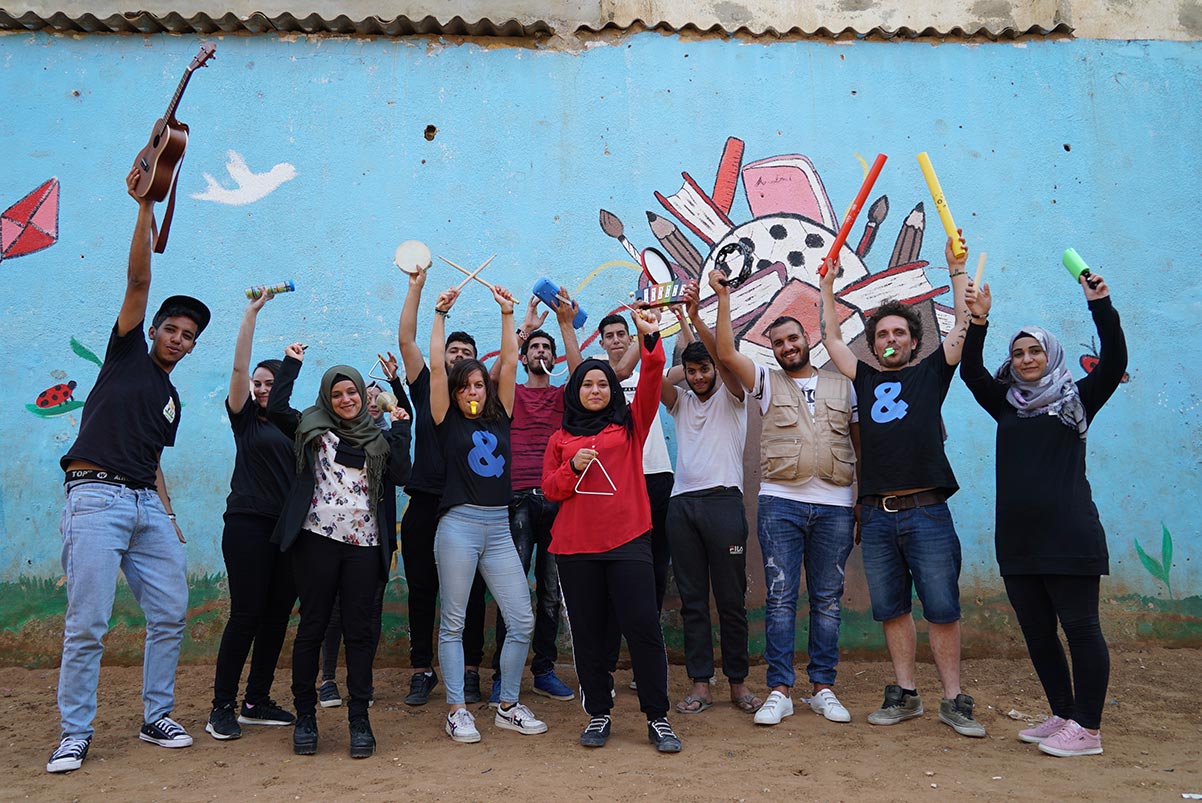
What does the organization do?
In short, we use the power of music to train strong community builders.
Sounds of Change was founded in 2017, with the aim to find and train community builders for the future – the new community leaders. We use music to train adults and youth of all ages from local partner organizations (schools, NGO’s, community centers) in areas of conflict, so they can strengthen their communities on the ground.
Currently, we work in refugee camps and marginalized communities in Lebanon, Jordan, Egypt, Iraq, Palestine (Westbank), and the Netherlands.
Sounds of Change facilitates a creative music process creating space for people to express themselves as individuals and as a community. We compose and improvise music that reflects the identity of the individual and the group. This creates (self) awareness and connection. Sounds of Change objective is to create sustainability and interdependence. Therefore, we run “train-the-trainer’ programs in which locals are trained to integrate our approach, techniques, and mindset to their own work environment and work practices.
What was the organization working on that led you to work the Genuine Contact way?
Maite: We were working on the strategy of the organization, that was where we started to work with Genuine Contact. Actually, before that we also worked with it with the board and with our trainers, but that was for a different goal. But we went deeper into working this way when we wanted to work on our strategy.
Lucas: We were also growing and expanding our team. At that moment of growth, we realized it helped for people to connect and work together on strategy, it helped us to connect together instead of just being individuals.
Maite: At the point we started with the Strategy, I was coming into the management, I had started as a trainer.
Lucas: The meeting between the board and the trainers had been really meaningful. In addition, content-wise we were already using some things related to the GC approach. I knew Genuine Contact before because I had met Doris. When I wanted to get more in contact with being a leader, I followed the Cross Cultural Conflict Resolution workshop with her. Finding ways to make decisions together is already working with conflict.
Maite: At the time we started to work with our strategy we realized we needed to take steps to develop more solid values.
The reason we decided to contact Doris, and work with the Genuine Contact approach, was because we were working on our values, and wanted to know how to use our values to actually engage others and create a community.
In addition, our team grew to three when our Business Director entered, and so we wanted to have a new starting point with a new Organizational leader.
Lucas: The process with Strategy was a deep process where we were more able to go to the intuition part and step into the values.
You’ve been working with Genuine Contact processes as the way to get this work done. Can you share more about this process?
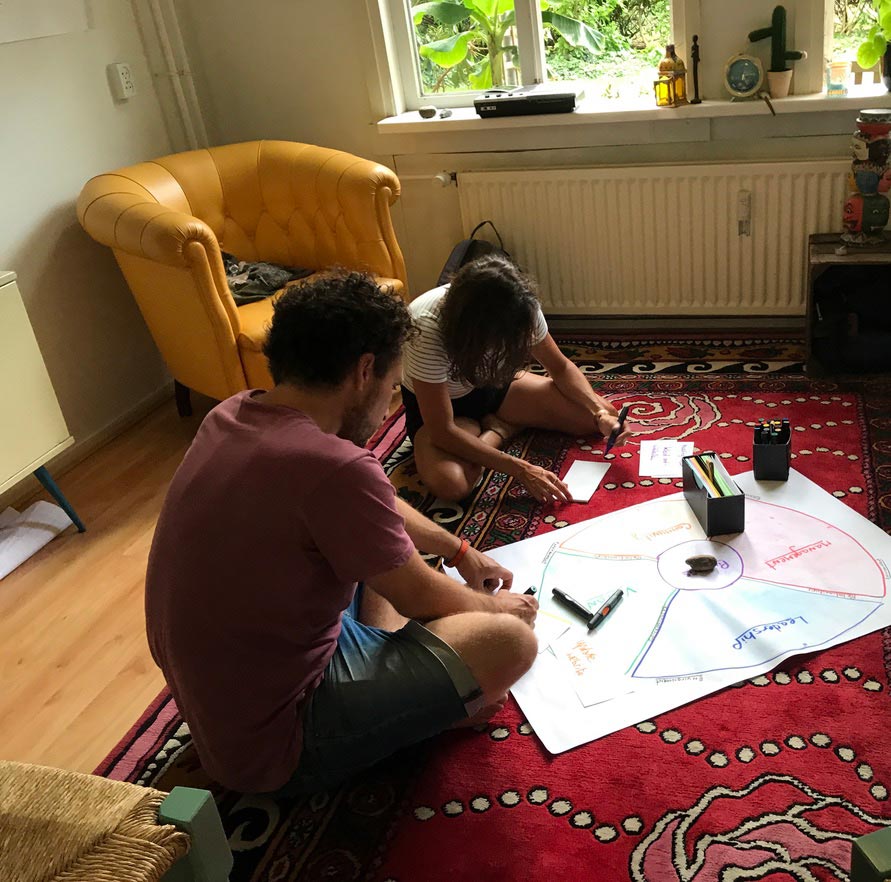
Lucas: The process helped us to feel the things we say and want to do and what we work towards. We made the strategy, but we also started to feel the strategy.
Maite: It starts from your personal connection and for each of us that is a different starting point. From these individual points we were able to bring it back together. For example, starting the sessions, I could feel overwhelmed, but it always started with looking from my own perspective. Then we could connect to our individual experiences, and we could see what it meant for the organization and I could always contribute because there was the value of each person’s individual attachment to the organization and making decisions from that.
Lucas: Also at the core of GC is that there are lots of things you already know but don’t see yet, you don’t need strategy experts because we know it and GC helps to SEE what we already have.
Maite: The models that we used, like the Deep Essence Tool, helped give an overview of our perspective, to see where we are, where do we want to go…so it gave knowledge and information and structure to fill in the gaps.
Lucas: The session we did about stakeholders stands out for me. Normally I may just take a spreadsheet and write out these are our stakeholders or donors, but I don’t see it. The moment we made circles and used stones to see the connections we were able to see the relationships (During the stakeholder work the group was invited to put out stakeholders in relation to the organization using stones drawing connections).
In GC processes you can see the relationship between things. The whole environment worked with us, taking a walk, bringing information back, using the whole space and putting it into your body.
Has the use of Genuine Contact methods in this project also influenced how you work within the organization itself?
Maite: It influences us in the whole organization because we always come back to the values that came out of the sessions, and we involve our team in that. It became a base layer to work from. In general, it is always the guideline for the training sessions. Also in this Corona Time the whole idea of how we continue to do our work was difficult until we came back to realize that we have strong values, and we can work with them and that relating back to the purpose and the values made it easier to figure out how to do this.
This is also true in every challenge we face, this going back to values always supports us. We go back to our values or ask the other organizations we work with about their values.
Lucas: On a practical level we borrowed some things to make our own, in how to facilitate things. How to facilitate conversations, like using sharing circles, Hopes and Fears, and sometimes we make a variation to fit our circumstances and sometimes we use them directly.
The feeling of the relationships is something I use in Sounds of Change, to make it tangible, to put things on the ground, and visualize them and then step into things, physically. Like putting things on papers and putting them on the ground and standing on them and feeling them.
We also use GC methods in preparing our trainings. We take a lot of inspiration from the way that Doris facilitates.
Maite: Our leadership improved a great deal over the time we have worked in this way.
Even in the best projects, there are sometimes struggles. How has your leadership navigated these challenges?
Lucas: One main struggle is that we want to roll out sustainable long-term impact programs and we want to commit to people for a long term and make them independent, but sometimes our partners have different ideas. That’s a big struggle because we don’t want to lose our money or energy for what we believe in, but our partner organizations change. One thing that helped me to deal with this are the OST Principles of “Whoever are there are the right people” and “It starts at the right time and is over when it is over” It is still really difficult, but the OST principles help me to accept that things go different from what I would want.
So, it helps when real life situations intrude on what our hopes would be about how we want to work.
We have to trust the outcome will be okay and that we attract the people who want the things we do and trust in that.
Maite: At times when there have been challenges in relationship to the board, we were able to think ahead about what we stand for and what we want to ask from the Board, so we became more pro-active instead of re-active. We also worked on trusting that we have something valuable, even though we didn’t have so much previous experience in working with a board, but we trusted that we still have something important to say.
Lucas: And at the same time to invite them to bring in their expertise. In that way we coach the board a bit and each other…
Maite: Lucas and I are different in many ways, and we can add from our differences. We really look at how to complement each other when there is a struggle. For example: When one person is feeling really stressed there is always a danger that the other person may have a different perspective on the situation, so how can I help the stressed person so that we balance the energy. And vice versa, we work to balance one another and look for each other’s differences to empower the other person.
Lucas: In the beginning, we tended to discuss things a lot together, because we didn’t want to take too much space or were afraid of not taking enough space, and over time we balanced that, seeing there are things we want to discuss, but especially seeing the other side that we don’t have to discuss certain things. And then learning to celebrate the decision the other person makes and to celebrate being autonomous.
Maite: We are also learning how to recognize and give space for more autonomy together.
This is related to the struggle of losing one another because we sometimes want to discuss too much or
things are changing in the organization so during the process we learned to notice what it means to let go, and to work with the grief cycle, ex: because there is growth and other people are taking responsibilities. As we become aware of it, we can give space for that grief, and find ways to navigate through the emotions that are arising. And this is something that always comes back. For example, now we are looking for a new staff member, and we again are using this knowledge of the grief cycle to give space to the emotions about it.
It means that we stay strongly connected to the core of what we are and why we do what we do. It is important because there is always so much advice. It gets confusing. Now I am able to realize, wait we do it differently and it’s new, and as long as we go back to the core and know what we are doing then we can make our own decisions. We learn to trust our own instincts even with all the change.
People can sometimes be hesitant about working in new ways. What did you notice about how your Sounds of Change colleagues experienced this way of working?
Lucas: In terms of stakeholders: The trainers adapted very easily, they totally understand and feel it. There is a strong connection with GC methods in the way we work, so they are on the same page. There is also a different level of trust because we work closely with one another and experience things together and experience the way we work. The trust between ourselves and the trainers is different because we have experiences together. The trainers we have were attracted to the way we work. So, leading these sessions using GC way is already close to their values.
With the board there is more of a story. In the board, there is sometimes more resistance. The board is part of the organization because of the stories they hear and due to their belief in the organization, but they have less experience of what we are doing “on the ground.” For example, they would understand for example why we do a transfer-in better if they had that experience. They come from a different perspective where it is not usual to work in this personal way, and they have other experiences of boards, but now they also are building experience with it through us taking the lead to incorporate things like transfer-ins.
This is a vulnerable way of working, it’s experimental and personal.
Is there anything more you want to share about your experiences with the Genuine Contact way of working?
Maite: I like the reflective part of working with GC, also now doing this interview, keeps bringing me back to the core, and each session we do creates an overview and a clear pathway and space and gratitude for what already exists and what is strong, so we can go from there.
Lucas: I like the slowing down; I say that after every session. The way a GC session is built up there is no time stress, this creates so much air and space it is an amazing value to structure things in a way that everything in what you do has equal attention or value. It’s a democratic way of building a session, you don’t stress at the end because you have enough space.
This is something especially important that I learned from Genuine Contact. Be flexible in the moment, don’t over plan. When something needs attention, we give it attention. Thinking back on the strategy session, each day I would think how are we going to spend the whole day on only these three things, then after I would find that it was so great that we could dive deeply into the things.
Maite: You learn life lessons, it is not about just running an organization, and I really like it because it’s how I want to live and work and see that things are not separate.
Lucas: One other image for me is that it is so related to nature. All the frameworks and tools are so related to how things in nature grow, intuitive, and happening in the moment. Everything influences the growing process and no tree is the same as another tree because they grow intuitively and that is also true for organizations. There is no step-by-step plan or book, it’s successful when it is intuitive and growing with what is there.
Maite: Yes, there is a perspective or guidelines for following the spirit.
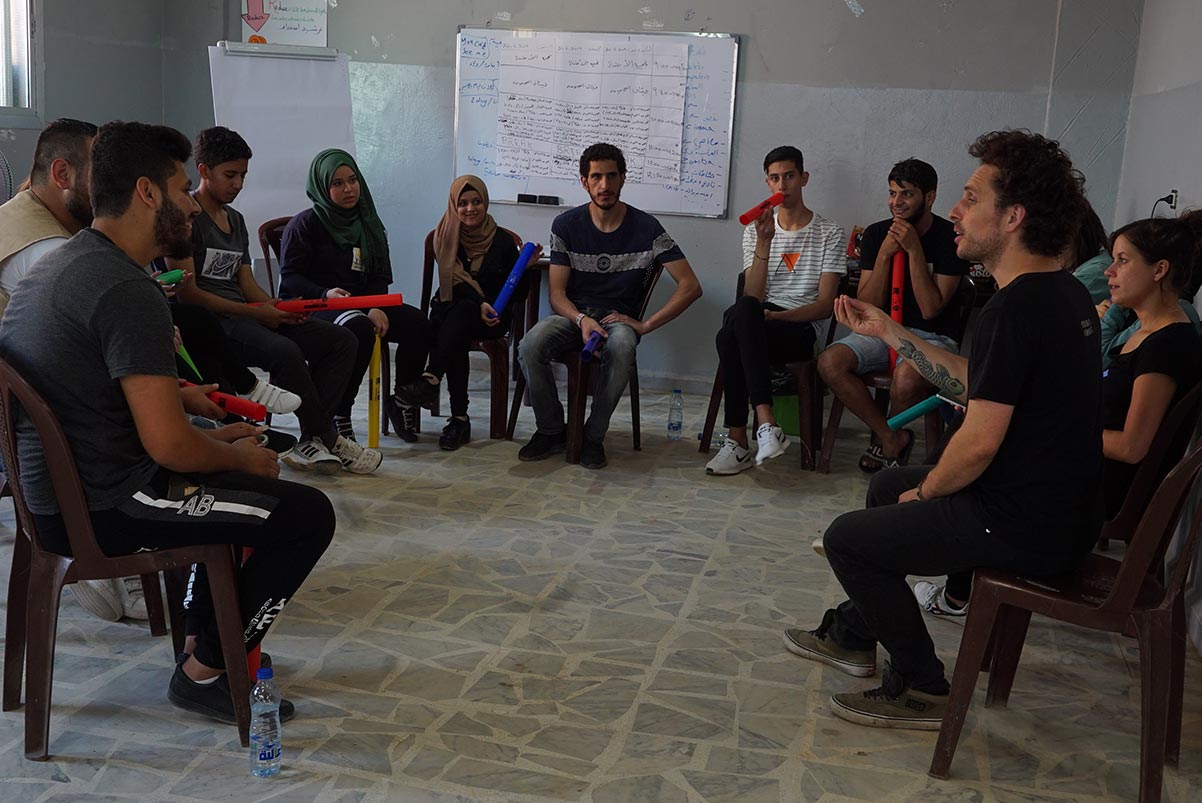



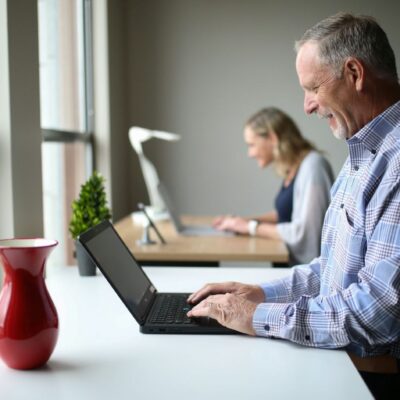
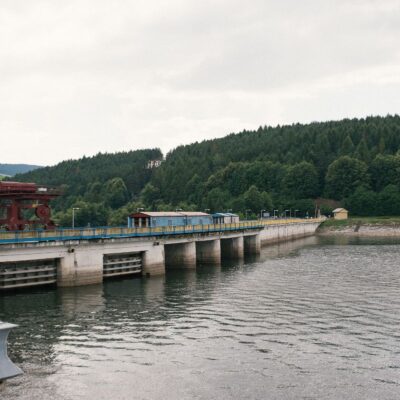
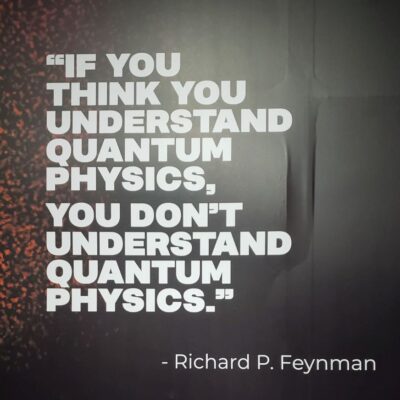

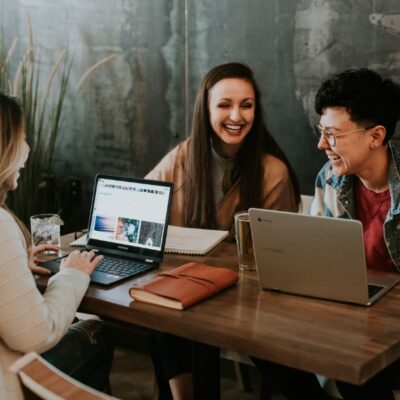
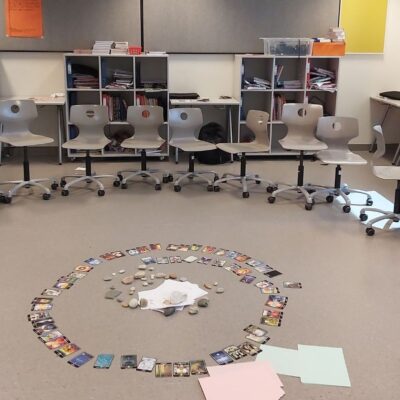
Leave a Reply